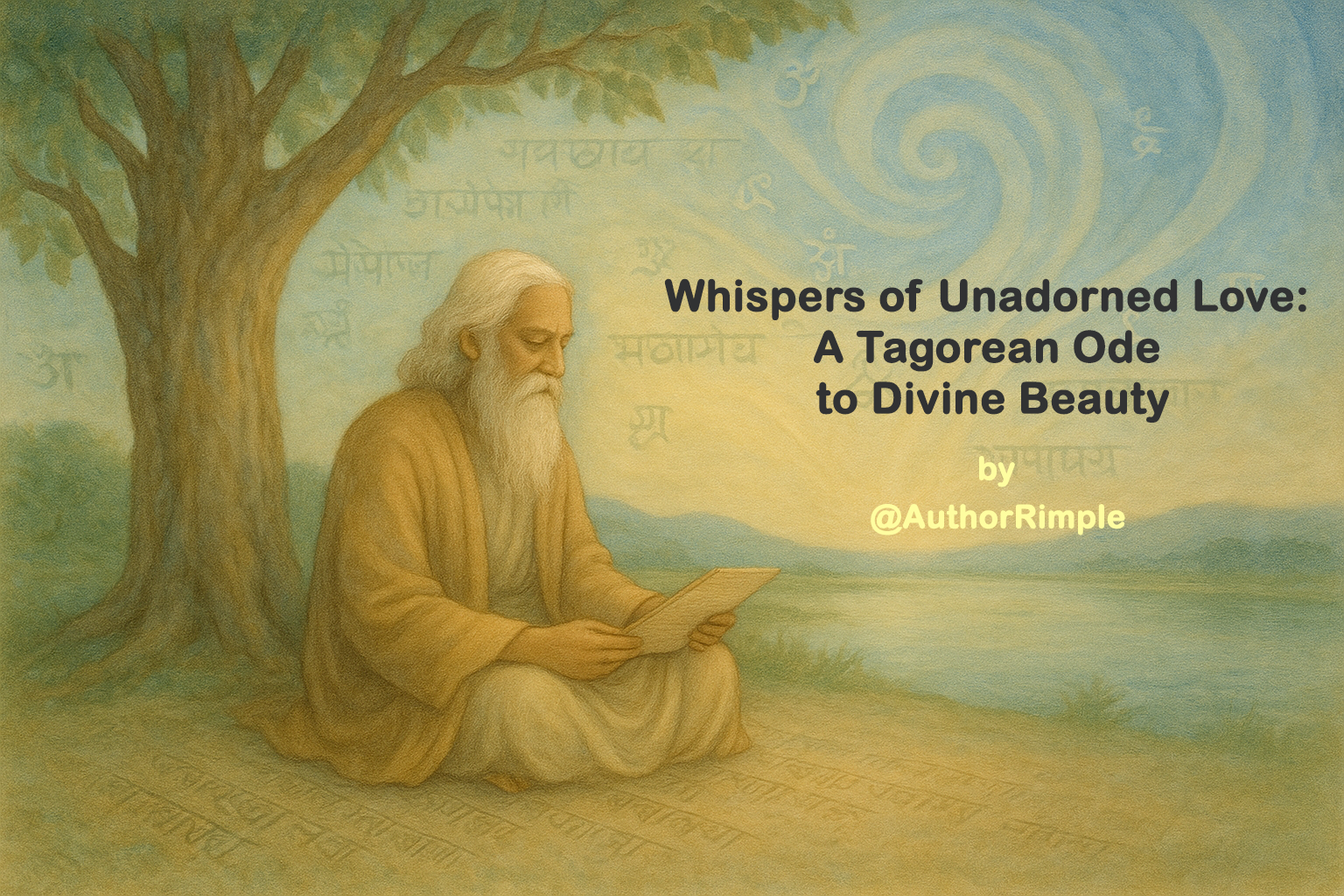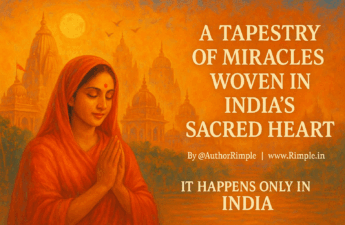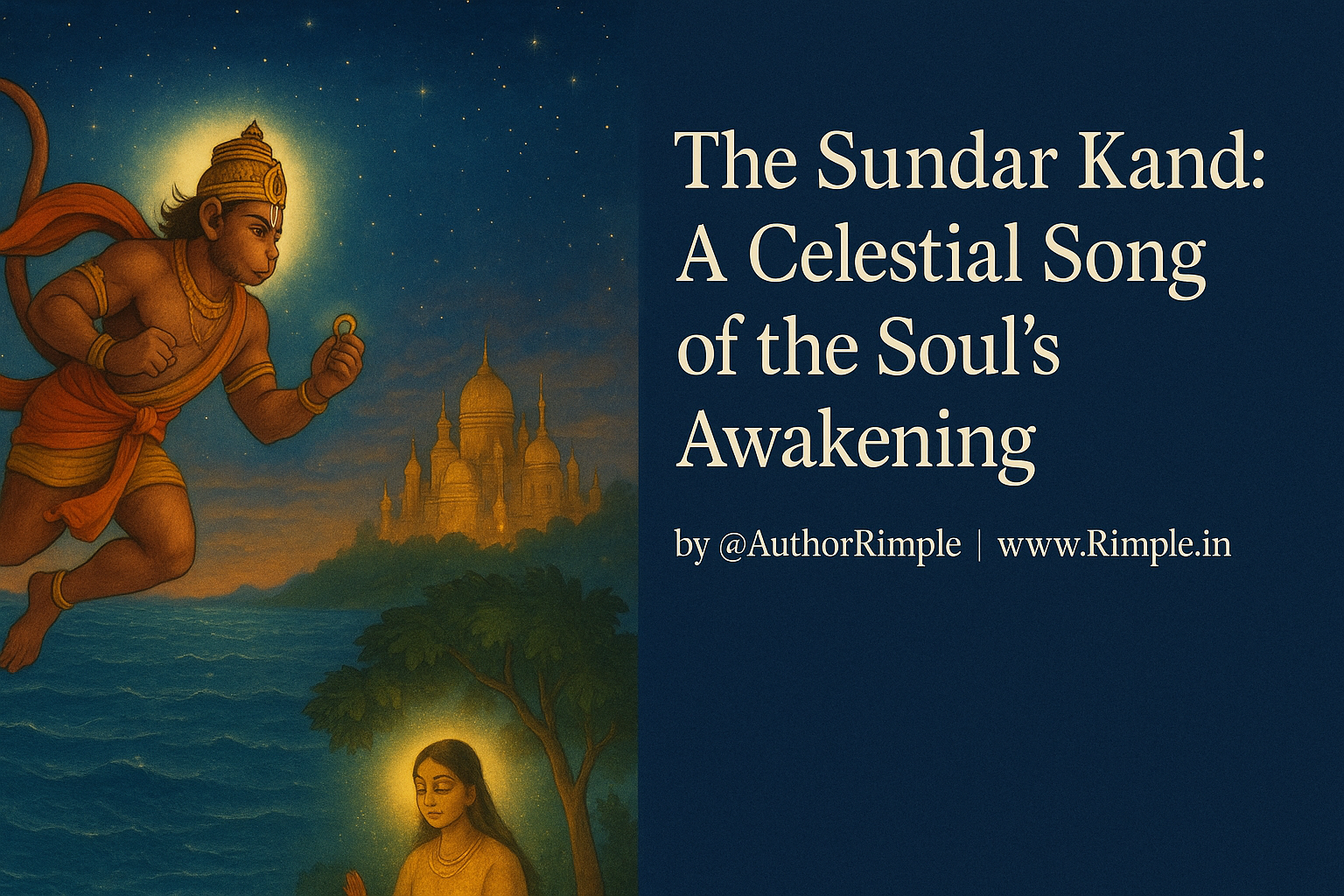The song speaks of the time when there was no electricity and women used lamps for adornments. It is a song from “Gulzar in conversations with Tagore”. The poem of Rabindranath Tagore or inspired by him…
The Central Theme: The Divine Feminine and Unadorned Love
This poetry is a sacred ode to the beauty of the unadorned, a celebration of the woman as a vessel of the divine. The man’s love is not swayed by the mirror’s gaze—kohl, garlands, anklets hold no dominion over his heart. He sees her as a reflection of the eternal feminine, her simplicity a mirror to the cosmos’s own grace. This is not lustful passion but a reverence that kneels before her soul, a passion that burns with the purity of prayer.
The woman, in her raw authenticity—her scattered hair, her mud-stained feet, her unadorned eyes—is a living poem, her imperfections the verses of her truth. The man’s call, “जैसी हो वैसी ही आ जाओ”, is a divine summons, an invitation to stand in her essence, unapologetic and radiant. Their love is a sacred union, a dance of souls that echoes the rhythm of the universe—eternal, unblemished, divine.
Setting: A Rustic Prelude
एक दिहाती सर पे गुड़ की भेली बांधे
लम्बे चौड़े एक मैदान से गुज़र रहा था
गुड़ की खुशबू सूँघके भिन भिन करती
एक छतरी सर पे मंडळाती थीधूप चढ़ी
और सूरज की गर्मी पहुंची तो
गुड़ की भेली बहने लगी
मासूम दिहाती हैरान था
माथे से मीठे मीठे क़तरे गिरते थे
और वो जीभ से चाट रहा था
मैं दिहाती
मेरे सर पे ये टैगोर की कविता भेली
किसने रखदी?
A villager, with jaggery bound upon his head,
Treads through a field, vast and widespread.
The jaggery’s scent hums, a sweet refrain,
An umbrella buzzes, dancing in the sun’s domain.
The sun ascends, its warmth unfolds,
The jaggery melts in streams of gold.
Bewildered, the innocent soul does pause,
Sweet droplets fall, his heart’s applause.
He tastes them, wondering, simple and free,
“Who placed this Tagore’s poetry on me?”
A simple villager, a dihati, treads across an endless field, a bundle of jaggery tied to his head. The sun rises, its golden warmth kissing the jaggery, which melts into sweet rivulets down his forehead. In his childlike wonder, he tastes the sweetness, marveling at the poetry of Tagore that seems to have been placed upon him by some unseen hand. This rustic scene is a tender prelude, a metaphor for the poem itself—a humble soul carrying the divine sweetness of love’s truth. The jaggery, melting under the sun’s gaze, is like love itself: unrefined, natural, flowing freely without pretense. The buzzing umbrella, the open field, the innocent delight—they weave a canvas of simplicity, preparing us for a love that is as pure as the earth, as radiant as the sky.
Starting Dialogues: The Hearth of Emotions
रहने दो..
सिंगार को रहने दो
सामने चूल्हा जल रहा है
धुआँ आँखों में लग रहा है
जलन भी है आनंद भीबस आते ही होंगे
जल्दी से संध्या पूजा हो जाए
जानती है वो क्या कहेंगे
Let adornments rest, let them be…
Let adornments rest, set them free.
Before me, the hearth’s flames softly glow,
Smoke stings my eyes, where tears and joy flow.
A burning ache, yet bliss does rise,
Soon he’ll come, beneath these skies.
Hasten, let evening’s prayers take flight,
I know the words his heart will recite.
By a flickering hearth, a woman stands, the smoke curling into her eyes, a delicate blend of sting and bliss. She knows her beloved is near, and her heart quickens to complete her evening prayers. Yet, there is no haste to adorn herself, for she hears his voice, soft as a prayer: “रहने दो.. सिंगार को रहने दो”—let adornments rest.
This moment is a sacred pause, a breath of devotion. The hearth’s flame mirrors her inner fire, burning with love and reverence. The smoke in her eyes is not mere discomfort but a testament to her lived humanity, her willingness to embrace both pain and joy for love’s sake. Her anticipation of her beloved’s arrival is not anxious but serene, for she knows his heart seeks her truth, not her trappings. The beauty here is in her unguarded authenticity, her soul alight with the divine. The reader feels the warmth of this love, a love that asks for nothing but her presence, pure and unadorned, like a prayer whispered at dusk.
The Song
जैसी हो वैसी ही आ जाओ..
सिंगार को रहने दो
बाल अगर बिखरे हैं
सीधी मांग नहीं निकली
बांधे नहीं अंगिया के फीते
तो भी कोई बात नहीं
जैसी हो वैसी ही आ जाओ..
सिंगार को रहने दो
Come as you are, in your truth divine,
Let adornments rest, their need decline.
If your hair is scattered, wild and free,
If your parting strays, untamed by decree,
If your blouse’s laces remain unbound,
No matter, no flaw in you is found.
Come as you are, in your truth divine,
Let adornments rest, their need decline.
“Come as you are, just as you are… let adornments rest.” Her hair may be scattered like clouds after a storm, her parting crooked, her blouse’s laces undone. Yet, her lover’s voice, tender as moonlight, assures her: “तो भी कोई बात नहीं”—it matters not.
This verse is a love song to vulnerability, a celebration of the woman’s unpolished grace. Her disheveled hair, her untied laces—they are not flaws but strokes of a divine artist, painting her as a living poem. The man’s love, pure and untainted, sees her as a goddess, her imperfections a sacred script of her humanity. The refrain “जैसी हो वैसी ही आ जाओ” is a vow, a promise that her essence is enough, more radiant than any jewel. The reader’s heart stirs, longing for a love that embraces the raw, unfiltered self, where beauty is not crafted but simply is, like a river flowing to the sea.
ओस से भीगी मट्टी में
पाऊं अगर सन्न जाएं तो
घुंघरू गिर जाए पायल से
तो भी कोई बात नहीं
आकाश पे बदल उमड़ रहे हैं
देखा क्या?
गूंजे नदी किनारे से सब उड़ने लगे हैं
देखा क्या?
बेकार जलाकर रखा है
सिंगार दिया हवा से काँप के
बार बार उड़ जाता है
सिंगार दिया
जैसी हो वैसी ही आ जाओ..
सिंगार को रहने दो
If your feet sink deep in dew-kissed clay,
If anklets’ bells fall silent, fade away,
No matter, no loss in this sweet refrain.
Have you seen the clouds that swell the sky?
Have you heard the river’s song, where wings fly high?
In vain, the lamp of adornment burns,
It trembles, it fades, as the wind’s breath turns.
Again and again, it drifts, it dies,
The lamp of adornment in breezes flies.
Come as you are, in your truth divine,
Let adornments rest, their need decline.
Her feet sink into dew-kissed earth, the bells of her anklets falling silent. The sky swells with clouds, the riverbank hums with life, and birds soar into the heavens. The adornment lamp, lit in vain, flickers and fades in the wind’s embrace. Yet, her lover calls: “जैसी हो वैसी ही आ जाओ.. सिंगार को रहने दो”—come as you are, let adornments rest.
This verse is a hymn to the woman’s oneness with the cosmos. Her mud-caked feet, her silent anklets—they are not blemishes but emblems of her dance with the earth. The clouds, the river, the birds—they mirror her spirit, wild and free, unbound by the need for adornment. The flickering lamp, extinguished by the breeze, whispers that external beauty is fleeting, but her inner light is eternal. The man’s love, divine and unwavering, sees her as part of creation’s grand tapestry, her simplicity a reflection of the universe’s own beauty. The reader feels the pulse of this love, a sacred rhythm that binds two souls to the heartbeat of the world.
किसको पता है पलकों तले
दिया का काजल लगा नहीं
नहीं बानी है प्रान्दी तो क्या
गजरा नहीं बंधा तो छोड़ो
जैसी हो वैसी ही आ जाओ..
सिंगार को रहने दो
सिंगार को रहने दो
Who cares if kohl has not kissed your eyes,
If no lamp’s soot on your lashes lies?
If your braid lacks a garland’s bloom,
Let it be, let simplicity consume.
Come as you are, in your truth divine,
Let adornments rest, their need decline.
Let adornments rest, their need decline.
Who cares if her lashes lack kohl, if her braid is without a garland? The poem’s final plea is a crescendo of love’s purity: “जैसी हो वैसी ही आ जाओ.. सिंगार को रहने दो”—come as you are, let adornments rest. The repetition is a sacred chant, a vow etched in the stars.
This verse is the poem’s radiant heart, a testament to the woman’s divine beauty in her barest form. The absence of kohl or flowers does not dim her light; it amplifies it, for her true adornment is her soul, glowing with the brilliance of a thousand suns. The man’s love is not a fleeting spark but a worshipful flame, bowing before her as she is—human, flawed, divine. The reader is enveloped in this love’s embrace, feeling its sanctity, its power to heal and uplift. It is a love that whispers: You are enough, a truth that resonates in every heart.
The Beauty of This Poetry
The beauty of this poem lies in its delicate alchemy, transforming the ordinary into the divine. Like Tagore’s own verses, it finds the sacred in the smoke of a hearth, the mud of a path, the flicker of a lamp. Its Hindi words, simple yet profound, carry the cadence of a lullaby, soothing the soul with their gentle rhythm. The imagery—of clouds swelling, rivers singing, a woman’s unadorned grace—paints a world where love is not a possession but a communion, a meeting of hearts in the temple of the everyday.
Every reader, from the dreamer to the weary, feels the pulse of this love, the ache for a bond so pure it mirrors the divine. The poem is a mirror, reflecting our own longing to be seen, to be loved as we are—without adornment, without pretense. It is a reminder that true beauty lies in being, and true love is the courage to embrace the beloved’s truth, raw and unfiltered.
In this poetry, we glimpse the divine feminine, not as an ideal but as a living truth—wild, tender, eternal. And in the man’s unwavering love, we find a passion that is not of the body but of the soul, a flame that burns forever, lighting the way to the heart’s deepest home. रहने दो.. सिंगार को रहने दो—let adornments rest, for love itself is the greatest adornment of all.





